Business Communication and OB Theories: A Comprehensive Review
VerifiedAdded on 2022/09/09
|8
|1997
|42
Essay
AI Summary
This essay delves into the core concepts of organizational behavior (OB), examining the interplay between motivation theories, effective communication, and ethical considerations at individual, team, and organizational levels. The paper begins by defining OB and its focus on human behavior within organizational settings. It then explores various motivation theories, such as Maslow's hierarchy of needs and goal-setting theory, and their influence on individual performance and job satisfaction. The essay emphasizes the importance of effective communication for successful teamwork, highlighting the need for open feedback and clear communication channels. Furthermore, it discusses the significance of ethics and social responsibility in organizational decision-making, particularly through the lens of virtue ethics. The analysis emphasizes how these three elements are interconnected and crucial for organizational success, employee engagement, and a positive brand image. The essay concludes by reiterating the importance of these theories for management and leadership, emphasizing their role in addressing challenges and suggesting solutions for enhanced organizational performance.
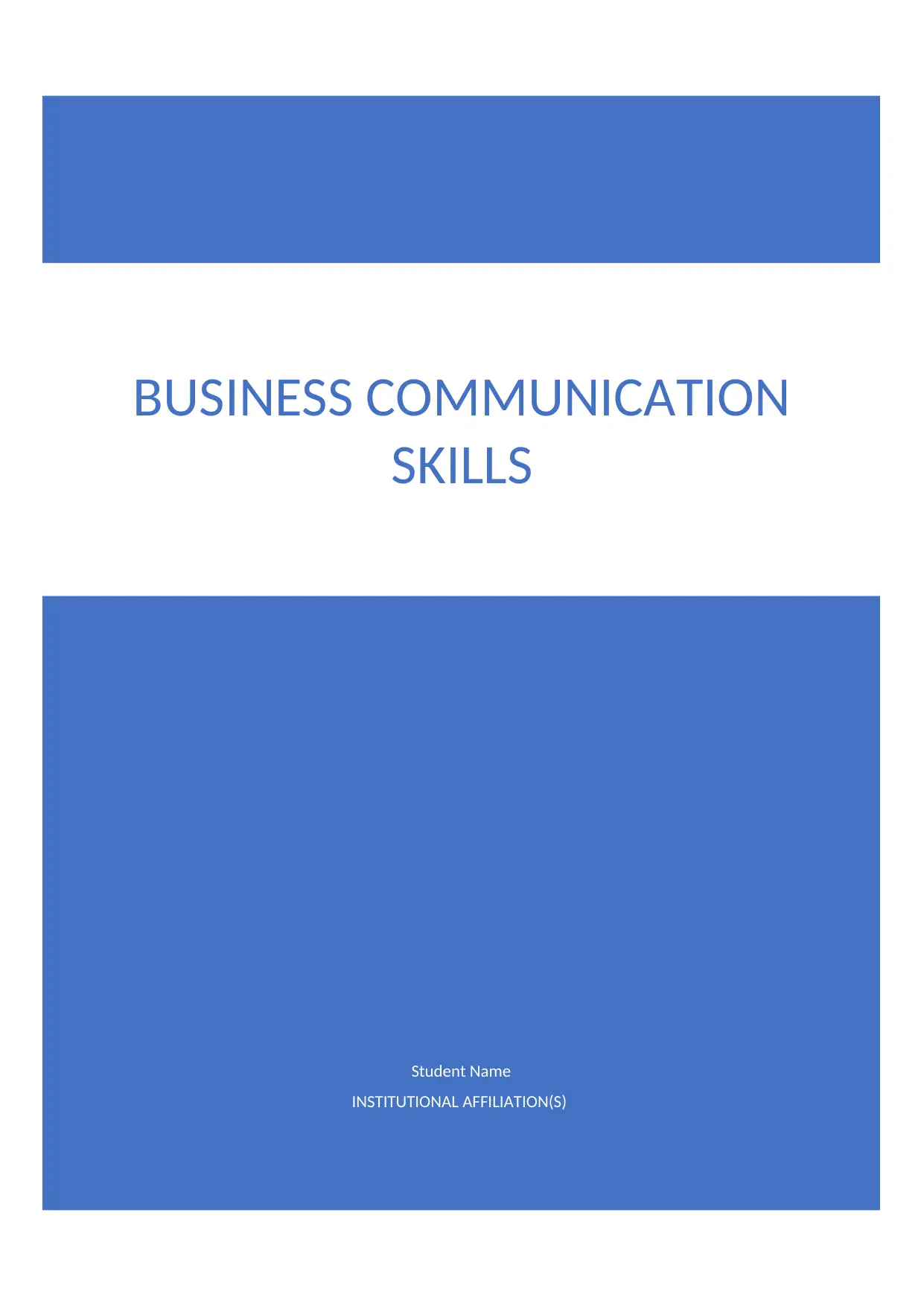
Student Name
INSTITUTIONAL AFFILIATION(S)
BUSINESS COMMUNICATION
SKILLS
INSTITUTIONAL AFFILIATION(S)
BUSINESS COMMUNICATION
SKILLS
Paraphrase This Document
Need a fresh take? Get an instant paraphrase of this document with our AI Paraphraser
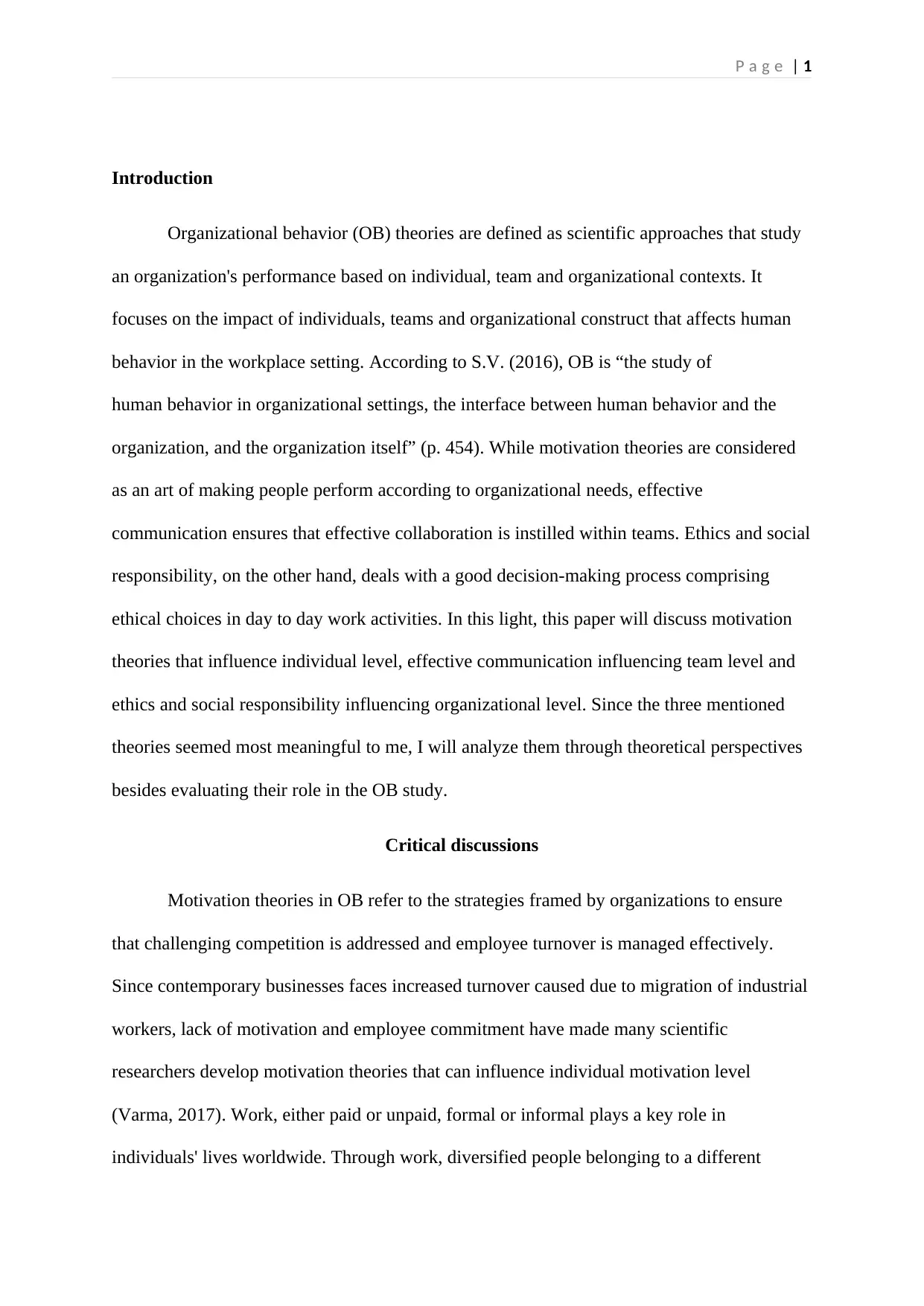
P a g e | 1
Introduction
Organizational behavior (OB) theories are defined as scientific approaches that study
an organization's performance based on individual, team and organizational contexts. It
focuses on the impact of individuals, teams and organizational construct that affects human
behavior in the workplace setting. According to S.V. (2016), OB is “the study of
human behavior in organizational settings, the interface between human behavior and the
organization, and the organization itself” (p. 454). While motivation theories are considered
as an art of making people perform according to organizational needs, effective
communication ensures that effective collaboration is instilled within teams. Ethics and social
responsibility, on the other hand, deals with a good decision-making process comprising
ethical choices in day to day work activities. In this light, this paper will discuss motivation
theories that influence individual level, effective communication influencing team level and
ethics and social responsibility influencing organizational level. Since the three mentioned
theories seemed most meaningful to me, I will analyze them through theoretical perspectives
besides evaluating their role in the OB study.
Critical discussions
Motivation theories in OB refer to the strategies framed by organizations to ensure
that challenging competition is addressed and employee turnover is managed effectively.
Since contemporary businesses faces increased turnover caused due to migration of industrial
workers, lack of motivation and employee commitment have made many scientific
researchers develop motivation theories that can influence individual motivation level
(Varma, 2017). Work, either paid or unpaid, formal or informal plays a key role in
individuals' lives worldwide. Through work, diversified people belonging to a different
Introduction
Organizational behavior (OB) theories are defined as scientific approaches that study
an organization's performance based on individual, team and organizational contexts. It
focuses on the impact of individuals, teams and organizational construct that affects human
behavior in the workplace setting. According to S.V. (2016), OB is “the study of
human behavior in organizational settings, the interface between human behavior and the
organization, and the organization itself” (p. 454). While motivation theories are considered
as an art of making people perform according to organizational needs, effective
communication ensures that effective collaboration is instilled within teams. Ethics and social
responsibility, on the other hand, deals with a good decision-making process comprising
ethical choices in day to day work activities. In this light, this paper will discuss motivation
theories that influence individual level, effective communication influencing team level and
ethics and social responsibility influencing organizational level. Since the three mentioned
theories seemed most meaningful to me, I will analyze them through theoretical perspectives
besides evaluating their role in the OB study.
Critical discussions
Motivation theories in OB refer to the strategies framed by organizations to ensure
that challenging competition is addressed and employee turnover is managed effectively.
Since contemporary businesses faces increased turnover caused due to migration of industrial
workers, lack of motivation and employee commitment have made many scientific
researchers develop motivation theories that can influence individual motivation level
(Varma, 2017). Work, either paid or unpaid, formal or informal plays a key role in
individuals' lives worldwide. Through work, diversified people belonging to a different
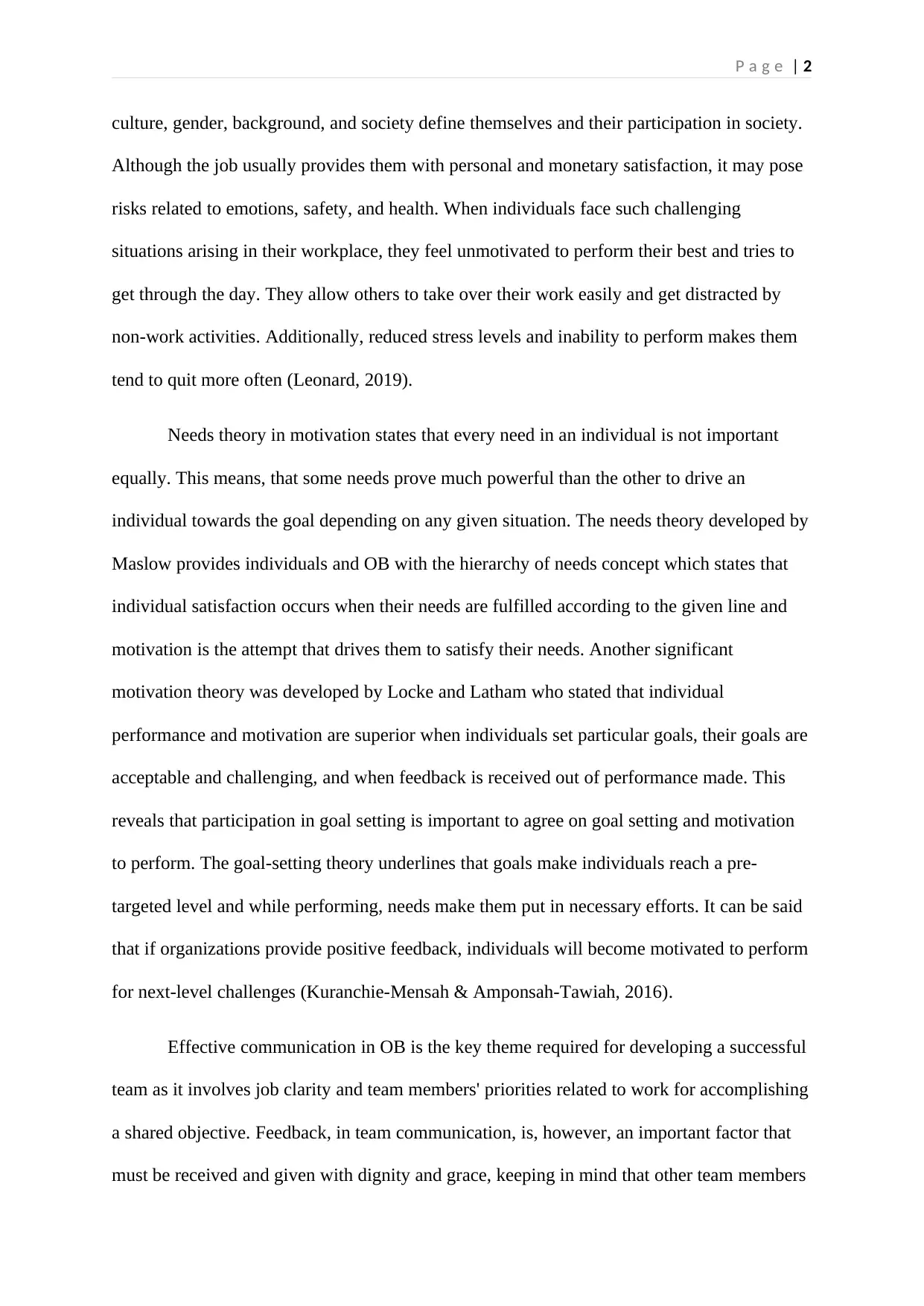
P a g e | 2
culture, gender, background, and society define themselves and their participation in society.
Although the job usually provides them with personal and monetary satisfaction, it may pose
risks related to emotions, safety, and health. When individuals face such challenging
situations arising in their workplace, they feel unmotivated to perform their best and tries to
get through the day. They allow others to take over their work easily and get distracted by
non-work activities. Additionally, reduced stress levels and inability to perform makes them
tend to quit more often (Leonard, 2019).
Needs theory in motivation states that every need in an individual is not important
equally. This means, that some needs prove much powerful than the other to drive an
individual towards the goal depending on any given situation. The needs theory developed by
Maslow provides individuals and OB with the hierarchy of needs concept which states that
individual satisfaction occurs when their needs are fulfilled according to the given line and
motivation is the attempt that drives them to satisfy their needs. Another significant
motivation theory was developed by Locke and Latham who stated that individual
performance and motivation are superior when individuals set particular goals, their goals are
acceptable and challenging, and when feedback is received out of performance made. This
reveals that participation in goal setting is important to agree on goal setting and motivation
to perform. The goal-setting theory underlines that goals make individuals reach a pre-
targeted level and while performing, needs make them put in necessary efforts. It can be said
that if organizations provide positive feedback, individuals will become motivated to perform
for next-level challenges (Kuranchie-Mensah & Amponsah-Tawiah, 2016).
Effective communication in OB is the key theme required for developing a successful
team as it involves job clarity and team members' priorities related to work for accomplishing
a shared objective. Feedback, in team communication, is, however, an important factor that
must be received and given with dignity and grace, keeping in mind that other team members
culture, gender, background, and society define themselves and their participation in society.
Although the job usually provides them with personal and monetary satisfaction, it may pose
risks related to emotions, safety, and health. When individuals face such challenging
situations arising in their workplace, they feel unmotivated to perform their best and tries to
get through the day. They allow others to take over their work easily and get distracted by
non-work activities. Additionally, reduced stress levels and inability to perform makes them
tend to quit more often (Leonard, 2019).
Needs theory in motivation states that every need in an individual is not important
equally. This means, that some needs prove much powerful than the other to drive an
individual towards the goal depending on any given situation. The needs theory developed by
Maslow provides individuals and OB with the hierarchy of needs concept which states that
individual satisfaction occurs when their needs are fulfilled according to the given line and
motivation is the attempt that drives them to satisfy their needs. Another significant
motivation theory was developed by Locke and Latham who stated that individual
performance and motivation are superior when individuals set particular goals, their goals are
acceptable and challenging, and when feedback is received out of performance made. This
reveals that participation in goal setting is important to agree on goal setting and motivation
to perform. The goal-setting theory underlines that goals make individuals reach a pre-
targeted level and while performing, needs make them put in necessary efforts. It can be said
that if organizations provide positive feedback, individuals will become motivated to perform
for next-level challenges (Kuranchie-Mensah & Amponsah-Tawiah, 2016).
Effective communication in OB is the key theme required for developing a successful
team as it involves job clarity and team members' priorities related to work for accomplishing
a shared objective. Feedback, in team communication, is, however, an important factor that
must be received and given with dignity and grace, keeping in mind that other team members
⊘ This is a preview!⊘
Do you want full access?
Subscribe today to unlock all pages.

Trusted by 1+ million students worldwide
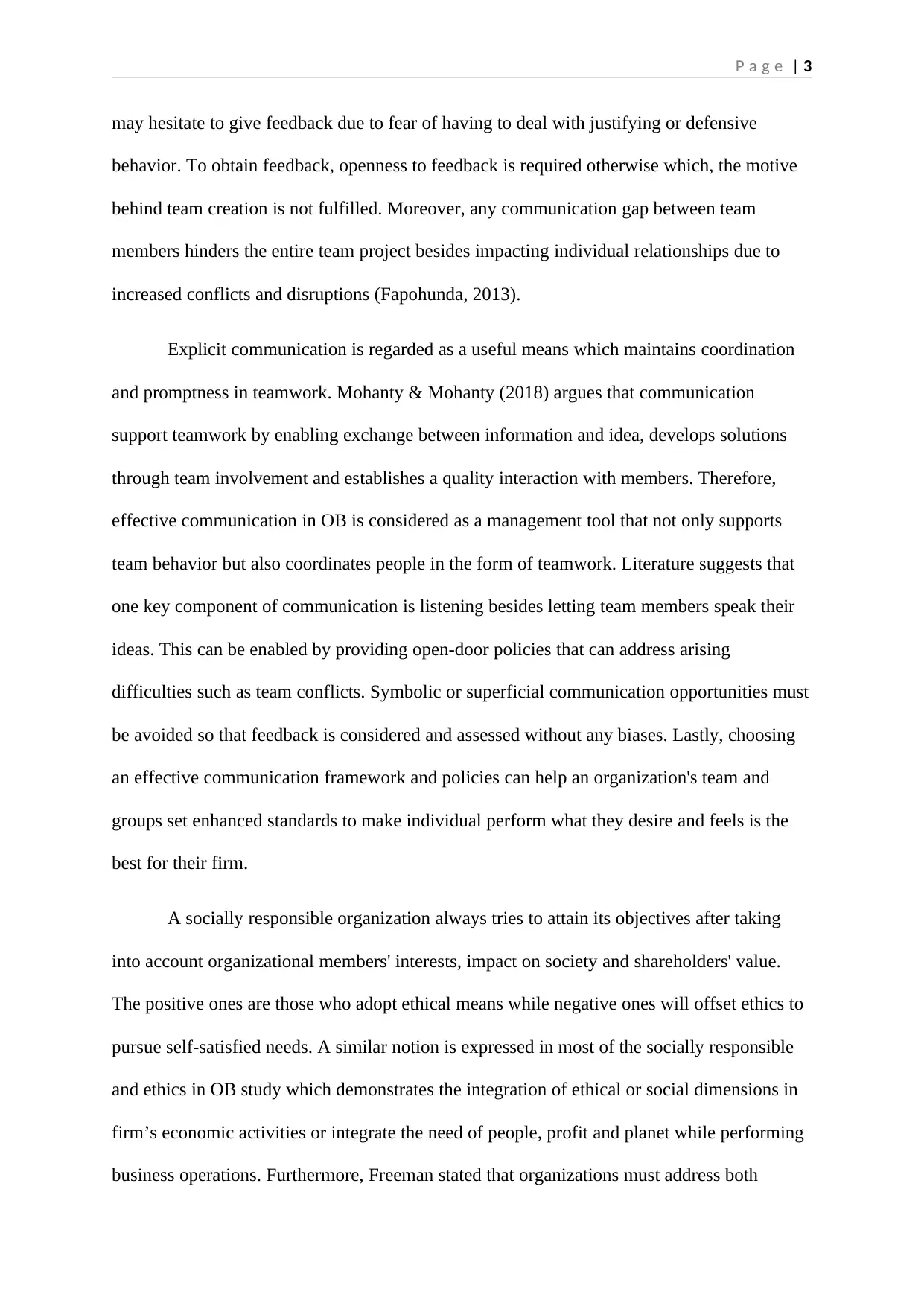
P a g e | 3
may hesitate to give feedback due to fear of having to deal with justifying or defensive
behavior. To obtain feedback, openness to feedback is required otherwise which, the motive
behind team creation is not fulfilled. Moreover, any communication gap between team
members hinders the entire team project besides impacting individual relationships due to
increased conflicts and disruptions (Fapohunda, 2013).
Explicit communication is regarded as a useful means which maintains coordination
and promptness in teamwork. Mohanty & Mohanty (2018) argues that communication
support teamwork by enabling exchange between information and idea, develops solutions
through team involvement and establishes a quality interaction with members. Therefore,
effective communication in OB is considered as a management tool that not only supports
team behavior but also coordinates people in the form of teamwork. Literature suggests that
one key component of communication is listening besides letting team members speak their
ideas. This can be enabled by providing open-door policies that can address arising
difficulties such as team conflicts. Symbolic or superficial communication opportunities must
be avoided so that feedback is considered and assessed without any biases. Lastly, choosing
an effective communication framework and policies can help an organization's team and
groups set enhanced standards to make individual perform what they desire and feels is the
best for their firm.
A socially responsible organization always tries to attain its objectives after taking
into account organizational members' interests, impact on society and shareholders' value.
The positive ones are those who adopt ethical means while negative ones will offset ethics to
pursue self-satisfied needs. A similar notion is expressed in most of the socially responsible
and ethics in OB study which demonstrates the integration of ethical or social dimensions in
firm’s economic activities or integrate the need of people, profit and planet while performing
business operations. Furthermore, Freeman stated that organizations must address both
may hesitate to give feedback due to fear of having to deal with justifying or defensive
behavior. To obtain feedback, openness to feedback is required otherwise which, the motive
behind team creation is not fulfilled. Moreover, any communication gap between team
members hinders the entire team project besides impacting individual relationships due to
increased conflicts and disruptions (Fapohunda, 2013).
Explicit communication is regarded as a useful means which maintains coordination
and promptness in teamwork. Mohanty & Mohanty (2018) argues that communication
support teamwork by enabling exchange between information and idea, develops solutions
through team involvement and establishes a quality interaction with members. Therefore,
effective communication in OB is considered as a management tool that not only supports
team behavior but also coordinates people in the form of teamwork. Literature suggests that
one key component of communication is listening besides letting team members speak their
ideas. This can be enabled by providing open-door policies that can address arising
difficulties such as team conflicts. Symbolic or superficial communication opportunities must
be avoided so that feedback is considered and assessed without any biases. Lastly, choosing
an effective communication framework and policies can help an organization's team and
groups set enhanced standards to make individual perform what they desire and feels is the
best for their firm.
A socially responsible organization always tries to attain its objectives after taking
into account organizational members' interests, impact on society and shareholders' value.
The positive ones are those who adopt ethical means while negative ones will offset ethics to
pursue self-satisfied needs. A similar notion is expressed in most of the socially responsible
and ethics in OB study which demonstrates the integration of ethical or social dimensions in
firm’s economic activities or integrate the need of people, profit and planet while performing
business operations. Furthermore, Freeman stated that organizations must address both
Paraphrase This Document
Need a fresh take? Get an instant paraphrase of this document with our AI Paraphraser
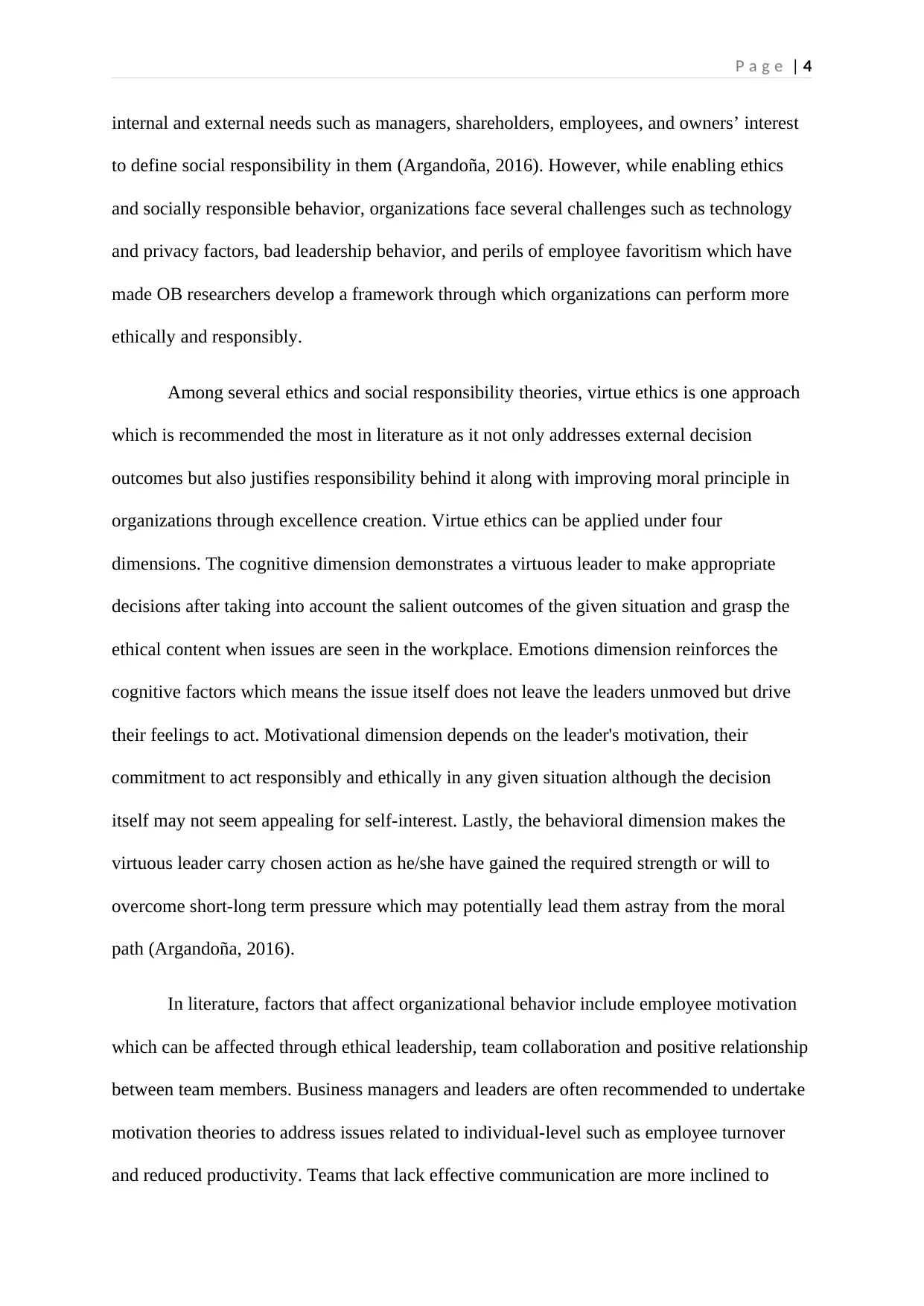
P a g e | 4
internal and external needs such as managers, shareholders, employees, and owners’ interest
to define social responsibility in them (Argandoña, 2016). However, while enabling ethics
and socially responsible behavior, organizations face several challenges such as technology
and privacy factors, bad leadership behavior, and perils of employee favoritism which have
made OB researchers develop a framework through which organizations can perform more
ethically and responsibly.
Among several ethics and social responsibility theories, virtue ethics is one approach
which is recommended the most in literature as it not only addresses external decision
outcomes but also justifies responsibility behind it along with improving moral principle in
organizations through excellence creation. Virtue ethics can be applied under four
dimensions. The cognitive dimension demonstrates a virtuous leader to make appropriate
decisions after taking into account the salient outcomes of the given situation and grasp the
ethical content when issues are seen in the workplace. Emotions dimension reinforces the
cognitive factors which means the issue itself does not leave the leaders unmoved but drive
their feelings to act. Motivational dimension depends on the leader's motivation, their
commitment to act responsibly and ethically in any given situation although the decision
itself may not seem appealing for self-interest. Lastly, the behavioral dimension makes the
virtuous leader carry chosen action as he/she have gained the required strength or will to
overcome short-long term pressure which may potentially lead them astray from the moral
path (Argandoña, 2016).
In literature, factors that affect organizational behavior include employee motivation
which can be affected through ethical leadership, team collaboration and positive relationship
between team members. Business managers and leaders are often recommended to undertake
motivation theories to address issues related to individual-level such as employee turnover
and reduced productivity. Teams that lack effective communication are more inclined to
internal and external needs such as managers, shareholders, employees, and owners’ interest
to define social responsibility in them (Argandoña, 2016). However, while enabling ethics
and socially responsible behavior, organizations face several challenges such as technology
and privacy factors, bad leadership behavior, and perils of employee favoritism which have
made OB researchers develop a framework through which organizations can perform more
ethically and responsibly.
Among several ethics and social responsibility theories, virtue ethics is one approach
which is recommended the most in literature as it not only addresses external decision
outcomes but also justifies responsibility behind it along with improving moral principle in
organizations through excellence creation. Virtue ethics can be applied under four
dimensions. The cognitive dimension demonstrates a virtuous leader to make appropriate
decisions after taking into account the salient outcomes of the given situation and grasp the
ethical content when issues are seen in the workplace. Emotions dimension reinforces the
cognitive factors which means the issue itself does not leave the leaders unmoved but drive
their feelings to act. Motivational dimension depends on the leader's motivation, their
commitment to act responsibly and ethically in any given situation although the decision
itself may not seem appealing for self-interest. Lastly, the behavioral dimension makes the
virtuous leader carry chosen action as he/she have gained the required strength or will to
overcome short-long term pressure which may potentially lead them astray from the moral
path (Argandoña, 2016).
In literature, factors that affect organizational behavior include employee motivation
which can be affected through ethical leadership, team collaboration and positive relationship
between team members. Business managers and leaders are often recommended to undertake
motivation theories to address issues related to individual-level such as employee turnover
and reduced productivity. Teams that lack effective communication are more inclined to
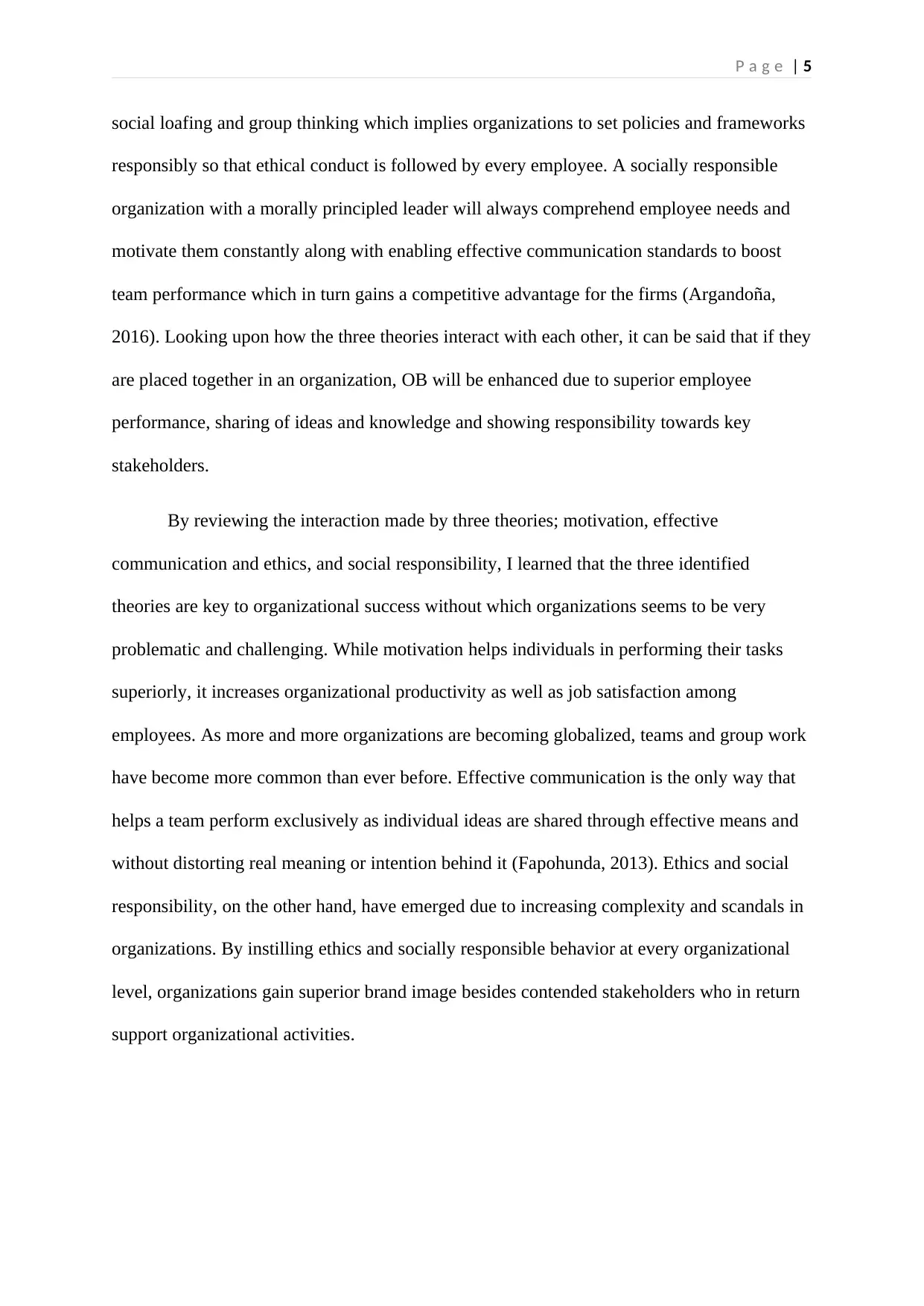
P a g e | 5
social loafing and group thinking which implies organizations to set policies and frameworks
responsibly so that ethical conduct is followed by every employee. A socially responsible
organization with a morally principled leader will always comprehend employee needs and
motivate them constantly along with enabling effective communication standards to boost
team performance which in turn gains a competitive advantage for the firms (Argandoña,
2016). Looking upon how the three theories interact with each other, it can be said that if they
are placed together in an organization, OB will be enhanced due to superior employee
performance, sharing of ideas and knowledge and showing responsibility towards key
stakeholders.
By reviewing the interaction made by three theories; motivation, effective
communication and ethics, and social responsibility, I learned that the three identified
theories are key to organizational success without which organizations seems to be very
problematic and challenging. While motivation helps individuals in performing their tasks
superiorly, it increases organizational productivity as well as job satisfaction among
employees. As more and more organizations are becoming globalized, teams and group work
have become more common than ever before. Effective communication is the only way that
helps a team perform exclusively as individual ideas are shared through effective means and
without distorting real meaning or intention behind it (Fapohunda, 2013). Ethics and social
responsibility, on the other hand, have emerged due to increasing complexity and scandals in
organizations. By instilling ethics and socially responsible behavior at every organizational
level, organizations gain superior brand image besides contended stakeholders who in return
support organizational activities.
social loafing and group thinking which implies organizations to set policies and frameworks
responsibly so that ethical conduct is followed by every employee. A socially responsible
organization with a morally principled leader will always comprehend employee needs and
motivate them constantly along with enabling effective communication standards to boost
team performance which in turn gains a competitive advantage for the firms (Argandoña,
2016). Looking upon how the three theories interact with each other, it can be said that if they
are placed together in an organization, OB will be enhanced due to superior employee
performance, sharing of ideas and knowledge and showing responsibility towards key
stakeholders.
By reviewing the interaction made by three theories; motivation, effective
communication and ethics, and social responsibility, I learned that the three identified
theories are key to organizational success without which organizations seems to be very
problematic and challenging. While motivation helps individuals in performing their tasks
superiorly, it increases organizational productivity as well as job satisfaction among
employees. As more and more organizations are becoming globalized, teams and group work
have become more common than ever before. Effective communication is the only way that
helps a team perform exclusively as individual ideas are shared through effective means and
without distorting real meaning or intention behind it (Fapohunda, 2013). Ethics and social
responsibility, on the other hand, have emerged due to increasing complexity and scandals in
organizations. By instilling ethics and socially responsible behavior at every organizational
level, organizations gain superior brand image besides contended stakeholders who in return
support organizational activities.
⊘ This is a preview!⊘
Do you want full access?
Subscribe today to unlock all pages.

Trusted by 1+ million students worldwide
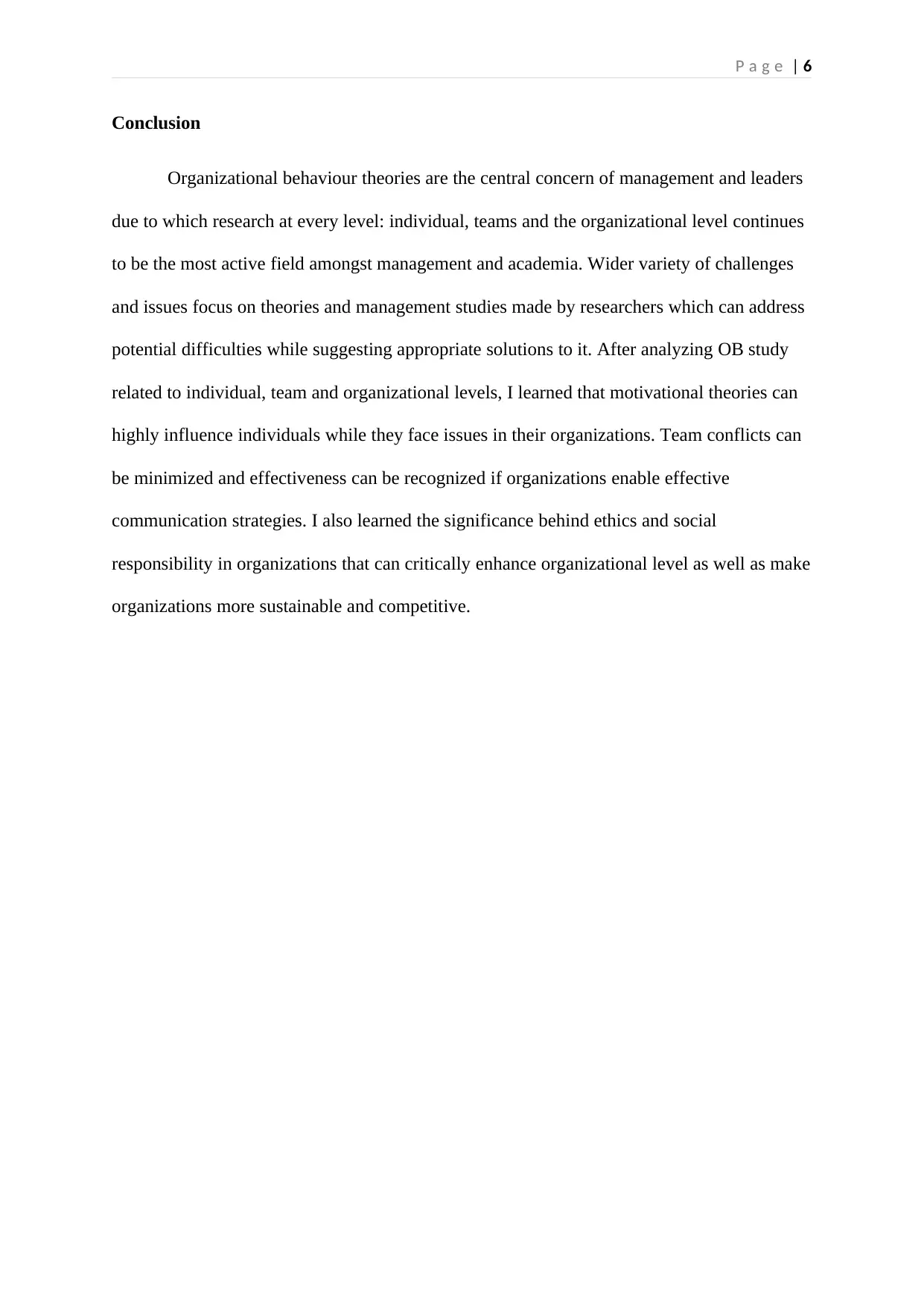
P a g e | 6
Conclusion
Organizational behaviour theories are the central concern of management and leaders
due to which research at every level: individual, teams and the organizational level continues
to be the most active field amongst management and academia. Wider variety of challenges
and issues focus on theories and management studies made by researchers which can address
potential difficulties while suggesting appropriate solutions to it. After analyzing OB study
related to individual, team and organizational levels, I learned that motivational theories can
highly influence individuals while they face issues in their organizations. Team conflicts can
be minimized and effectiveness can be recognized if organizations enable effective
communication strategies. I also learned the significance behind ethics and social
responsibility in organizations that can critically enhance organizational level as well as make
organizations more sustainable and competitive.
Conclusion
Organizational behaviour theories are the central concern of management and leaders
due to which research at every level: individual, teams and the organizational level continues
to be the most active field amongst management and academia. Wider variety of challenges
and issues focus on theories and management studies made by researchers which can address
potential difficulties while suggesting appropriate solutions to it. After analyzing OB study
related to individual, team and organizational levels, I learned that motivational theories can
highly influence individuals while they face issues in their organizations. Team conflicts can
be minimized and effectiveness can be recognized if organizations enable effective
communication strategies. I also learned the significance behind ethics and social
responsibility in organizations that can critically enhance organizational level as well as make
organizations more sustainable and competitive.
Paraphrase This Document
Need a fresh take? Get an instant paraphrase of this document with our AI Paraphraser
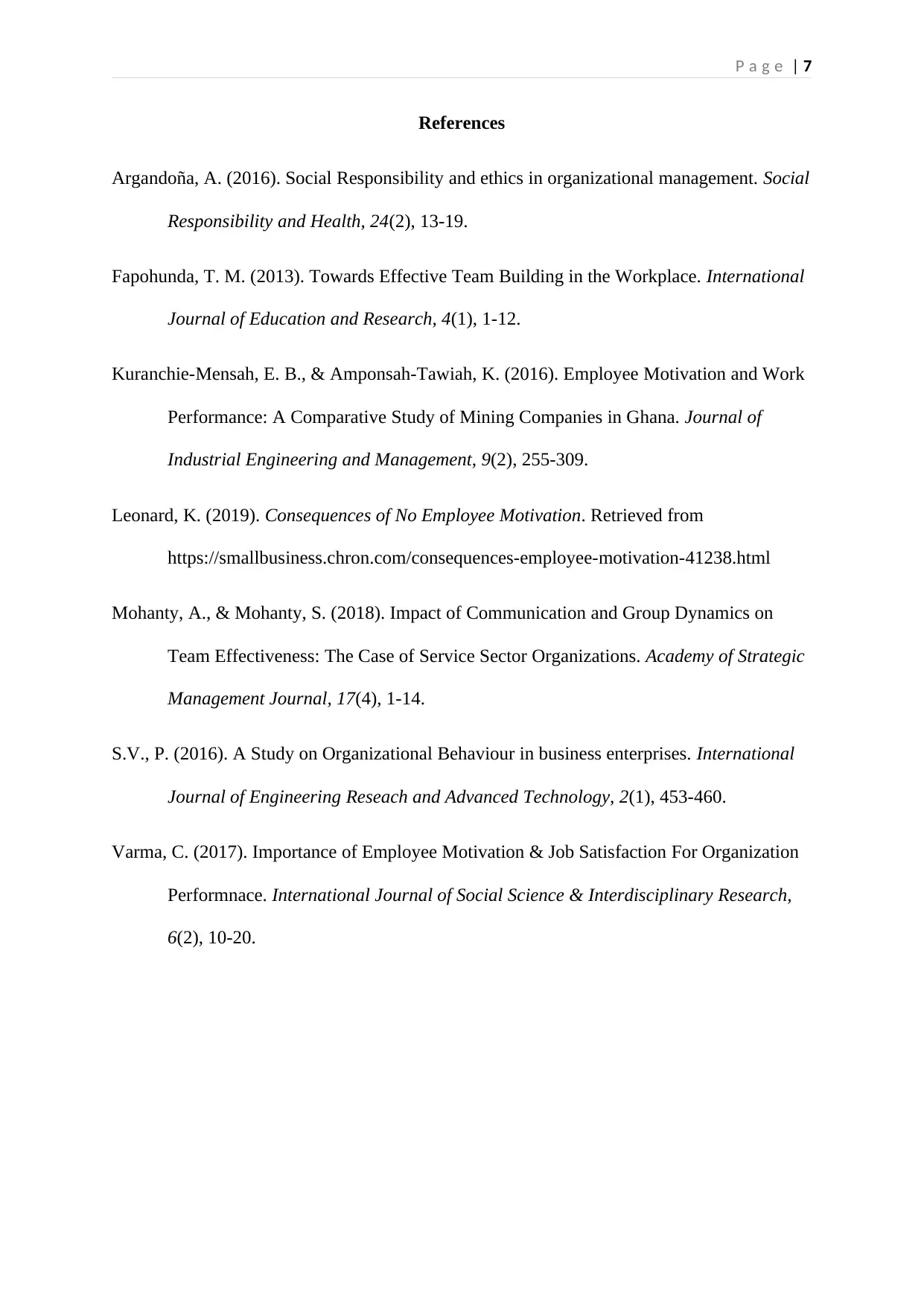
P a g e | 7
References
Argandoña, A. (2016). Social Responsibility and ethics in organizational management. Social
Responsibility and Health, 24(2), 13-19.
Fapohunda, T. M. (2013). Towards Effective Team Building in the Workplace. International
Journal of Education and Research, 4(1), 1-12.
Kuranchie-Mensah, E. B., & Amponsah-Tawiah, K. (2016). Employee Motivation and Work
Performance: A Comparative Study of Mining Companies in Ghana. Journal of
Industrial Engineering and Management, 9(2), 255-309.
Leonard, K. (2019). Consequences of No Employee Motivation. Retrieved from
https://smallbusiness.chron.com/consequences-employee-motivation-41238.html
Mohanty, A., & Mohanty, S. (2018). Impact of Communication and Group Dynamics on
Team Effectiveness: The Case of Service Sector Organizations. Academy of Strategic
Management Journal, 17(4), 1-14.
S.V., P. (2016). A Study on Organizational Behaviour in business enterprises. International
Journal of Engineering Reseach and Advanced Technology, 2(1), 453-460.
Varma, C. (2017). Importance of Employee Motivation & Job Satisfaction For Organization
Performnace. International Journal of Social Science & Interdisciplinary Research,
6(2), 10-20.
References
Argandoña, A. (2016). Social Responsibility and ethics in organizational management. Social
Responsibility and Health, 24(2), 13-19.
Fapohunda, T. M. (2013). Towards Effective Team Building in the Workplace. International
Journal of Education and Research, 4(1), 1-12.
Kuranchie-Mensah, E. B., & Amponsah-Tawiah, K. (2016). Employee Motivation and Work
Performance: A Comparative Study of Mining Companies in Ghana. Journal of
Industrial Engineering and Management, 9(2), 255-309.
Leonard, K. (2019). Consequences of No Employee Motivation. Retrieved from
https://smallbusiness.chron.com/consequences-employee-motivation-41238.html
Mohanty, A., & Mohanty, S. (2018). Impact of Communication and Group Dynamics on
Team Effectiveness: The Case of Service Sector Organizations. Academy of Strategic
Management Journal, 17(4), 1-14.
S.V., P. (2016). A Study on Organizational Behaviour in business enterprises. International
Journal of Engineering Reseach and Advanced Technology, 2(1), 453-460.
Varma, C. (2017). Importance of Employee Motivation & Job Satisfaction For Organization
Performnace. International Journal of Social Science & Interdisciplinary Research,
6(2), 10-20.
1 out of 8
Related Documents
Your All-in-One AI-Powered Toolkit for Academic Success.
+13062052269
info@desklib.com
Available 24*7 on WhatsApp / Email
![[object Object]](/_next/static/media/star-bottom.7253800d.svg)
Unlock your academic potential
Copyright © 2020–2026 A2Z Services. All Rights Reserved. Developed and managed by ZUCOL.




